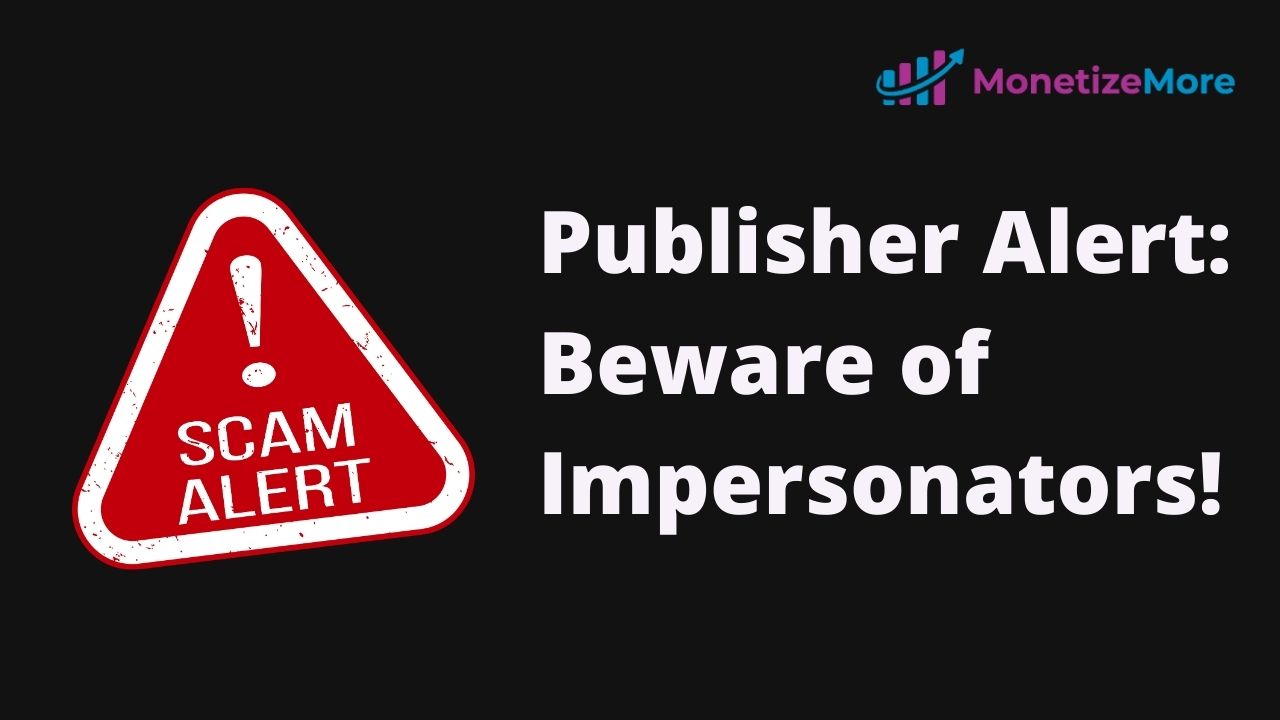At MonetizeMore, we’re dedicated to helping publishers like you maximize ad revenue. Unfortunately, we’ve discovered that some individuals are trying to take advantage of our reputation by impersonating us.
Recently, we identified a few impersonators that are deceptively mimicking our brand and services. This fraudulent site aims to mislead publishers and divert them away from MonetizeMore.
Here’s how to spot these impersonators:

- Trademark Infringement and Brand Misrepresentation: Domain names closely resembling our branding, design, or content may constitute trademark infringement under intellectual property laws. The Lanham Act (U.S.) and comparable international frameworks prohibit unauthorized uses of trademarks that could reasonably lead to consumer confusion. Being vigilant regarding minor misspellings or variations of our brand name is crucial, as scammers frequently employ these tactics to mislead unsuspecting publishers.
- Impersonation and Misrepresentation in Digital Content: Unauthorized duplication of website design, logos, or content aimed at creating a false sense of association may contravene copyright laws and unfair competition statutes. The Berne Convention and the U.S. Copyright Act restrict the replication of protected content without proper authorization, exposing impersonators to potential legal liability.
- Copied Branding: Impersonators may copy our website design, logo, and content to create a false sense of legitimacy. Always double-check the URL and website details to ensure you’re on the official MonetizeMore site.
- Missing Legal Information as a Compliance Indicator: Legitimate businesses have clear Privacy Policies and Terms & Conditions, under data protection laws such as the GDPR, CCPA, and others. The absence of these disclosures may signal non-compliance, particularly if the site collects user data, and could indicate unlawful operation. If these are missing, it’s a major red flag.
- Accurate Contact Information as a Standard of Business Transparency: Fake websites may use inaccurate or misleading addresses and phone numbers. Regulations like the CAN-SPAM Act (U.S.) require businesses to disclose verifiable contact details. Inaccurate or misleading contact information often indicates fraudulent activity and may subject operators to penalties for deceptive practices under consumer protection laws.
Protect Yourself:
- Always go to the official MonetizeMore website: Type “monetizemore.com” directly into your browser or use our official social media links.
- Be wary of unsolicited offers: Exercise caution with emails or messages from unknown senders promising unrealistic ad revenue.
- Verify company details: If you’re unsure about a website or offer, contact our support team directly to confirm its legitimacy.
We’re Taking Action:
We’ve reported these impersonators to the domain registrar and are taking steps to protect our publishers. We’re committed to fighting online fraud and ensuring that publishers have a safe and trustworthy experience with MonetizeMore.
Spread the Word:
Help us protect the publisher community by sharing this information with your fellow publishers. Together, we can prevent these scammers from harming our industry.
Stay vigilant, and remember, when in doubt, reach out to us directly!
With over seven years at the forefront of programmatic advertising, Aleesha is a renowned Ad-Tech expert, blending innovative strategies with cutting-edge technology. Her insights have reshaped programmatic advertising, leading to groundbreaking campaigns and 10X ROI increases for publishers and global brands. She believes in setting new standards in dynamic ad targeting and optimization.


